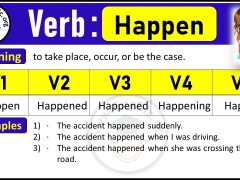story [ˈstɔːri] n. 故事
happen [ˈhæpən] v. 发生
【派】happening 事件
【扩】occur 发生
【搭】happen to do sth. 碰巧做某事
* * *
A: I guarantee that the same thing won't happen again.
B: I hope so. You must be more careful in the future.
A:我保证再不会发生同样的事情。
B:希望如此。你们以后一定要仔细一点儿。
* * *
thief [θiːf] n. 贼
enter [ˈentə] v. 进入
dark [dɑːk] adj. 黑暗的
【派】darkness 黑暗
【反】bright 明亮的
【搭】in the dark 在暗处
after dark 天黑后
* * *
A: It's dark outside already.
B: Let's finish up today.
A:外边天都黑了。
B:今天就干到这儿吧。
* * *
torch [tɔːtʃ] n. 手电筒
voice [vɔis] n. (说话的)声音
【派】voiceless 无声的
【扩】sound 声音
【搭】in a low voice 低声说
* * *
A: Please turn up the voice.
B: Can't you hear it clearly?
A:请把声音调大一点儿。
B:你听不清楚吗?
* * *
parrot [ˈpærət] n. 鹦鹉
* * *
A: Does the parrot have its own name?
B: Yes, its name is Polly.
A:这只鹦鹉有自己的名字吗?
B:有啊,它的名字叫波利。
Lesson 120 It had already happened. 事情已经发生了。
exercise book [ˈeksəsaiz-buk] 练习本
noun [抽象名词]故事,叙述;新闻报道;(尤指口头的)叙述,描述;谎言,虚假的借口;(书籍、电影、戏剧等的)情节;纪事,史话;楼层;情况;(公司的)商业前景,商业现状;谣言,传闻 - A story is a description of an event or something that happened to someone, especially a spoken description of it. (
verb [vt. 及物动词]用历史故事画装饰 - to decorate (a pot, wall, etc) with scenes from history or legends
verb [vt. 及物动词]发生;使遭遇;碰巧 - We cannot say for sure what will happen.
adverb [方式副词]<北英格兰>或许,大概 - He called Amy to see if she knew where his son was. As it happened, Amy did know.
"What happened?"(发生了什么?)是一个常用的英文短语(一般过去时),用于询问某个事件、情况或故事的经过或结果。它可以用于各种情境,包括但不限于以下几种:
1. 听到某个事件的一部分或片段后,想要了解完整的发生过程。
2. 见到某人情绪不对或表现异常时,想要了解他们遭遇了什么事情。
3. 对话中突然有暧昧的地方,想要得到更多的解释或细节。
4. 在某个剧情或故事的转折点上,想要知道接下来会发生什么。
"What's happening?"(正在发生什么?)是一个常用的英文短语,用于询问当前正在进行的事情或事件。它可以用于各种情境,包括但不限于以下几种:
1. 当你进入一个新的场景或环境,想要了解目前正在发生的活动或情况。
2. 当你注意到周围有一些活动或事件正在进行时,想要了解具体的细节。
3. 当你看到人们在忙碌或紧张地做某事时,想要了解他们所从事的具体活动。
4. 当你希望得到最新的消息或情况更新时,可以用这个短语来询问。
"happen to somebody"是一个常见的英文短语,表示某事发生在某人身上。它可以用于描述不同类型的事件或情况,如意外事故、好运、不幸或其他经历。下面是几个例子:
1. "What happened to John?"(约翰发生了什么事?)
2. "Good things always happen to her."(她总是有好运气。)
3. "I can't believe this happened to me."(我简直不能相信这发生在我身上。)
noun [专属名词]贼,小偷,偷窃犯 - The thief used a false identity.
verb [vt. 及物动词]进入;开始从事,开始做;参加,报名;登记,输入;正式提出;登场 - He entered the room briskly and stood near the door.
noun [具体名词]回车键(电脑键盘) - Knock before you enter.
adjective [原级]黑暗的,昏暗的;深色的,暗色的;恐怖的,悲惨的;神秘的,隐秘的;忧郁的,悲观的;邪恶的,阴险的;(头发、眼睛或皮肤)褐色的,黑色的;(剧院)关闭的,停业的;(嗓音)低沉圆润的;(语音)暗的 - People usually draw the curtains once it gets dark.
noun [具体名词]黑暗,暗处;暗色,阴影;黄昏,夜幕 - The light went out, and the room was plunged into darkness.
noun [具体名词]手电筒;火把;(象征具有重大积极影响的政治运动或思想的)火炬;喷灯;(美,非正式)纵火犯 - A torch is a small electric light which is powered by batteries and which you can carry in your hand.
verb [vt. 及物动词]纵火焚烧,放火烧 - Suddenly, somebody flashed an electric torch.
noun [抽象名词]嗓音,说话声,歌唱声;说话能力;歌唱能力; 发言权,表达意愿的权利(或方式);愿望,意见,呼声; - Miriam's voice was strangely calm.
verb [vt. 及物动词]表达,吐露(感情或意见);(语音)发浊音;(乐)给(管风琴)调音 - Some scientists have voiced concern that the disease could be passed on to humans.
noun [具体名词]鹦鹉;学舌者,机械模仿别人的人 - The parrot likes carrot.
verb [vt. 及物动词]机械地模仿,鹦鹉学舌般重复 - If you disapprove of the fact that someone is just repeating what someone else has said, often without really understanding it, you can say that they are parroting it.
noun [专属名词]练习本:一种用于学生做作业、练习和记笔记的纸质本子。 - He left his exercise book at home, so he didn't hand it in.
noun [抽象名词]运动,锻炼;(一套)动作,体操;练习,演练;运用;活动,任务;典礼;宗教仪式,礼拜 - Social structures are maintained through the exercise of political and economic power.
verb [vi. 不及物动词]运动,锻炼;运用,行使;使担忧,使烦恼;驯,遛 - They are merely exercising their right to free speech.









